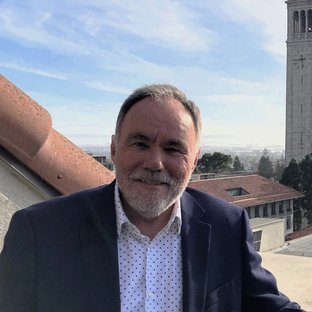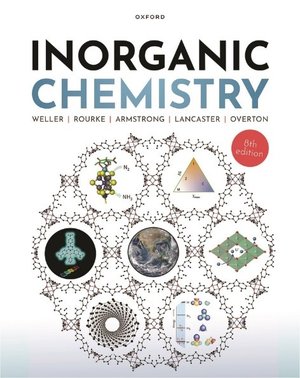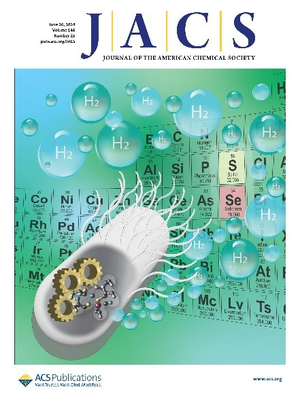
Professor Fraser Armstrong FRS
Biography
1978. PhD, University of Leeds where he studied solution kinetics under the supervision of Professor A. Geoffrey Sykes FRS.
1978-79. Royal Society Exchange Fellowship to work with Professor Peter Kroneck at the University of Konstanz.
1979-1983. Postdoctoral research stints with Professor Ralph Wilkins (New Mexico State University), Professor Helmut Beinert (Institute for Enzyme Research, Madison, Wisconsin) and Professor H. Allen O. Hill, Oxford.
1983-1989 Royal Society University Research Fellowship at Oxford.
1989-93. Assistant then tenured Associate Professor, University of California, Irvine.
1993-2021. Lecturer then Associate Professor, Dept. Chemistry, Oxford and Official Fellow
of St John’s College.
2021-present. Emeritus Research Fellow, St John’s College. PhD, University of Leeds where Professor Armstrong studied solution kinetics under the supervision of Professor A. Geoffrey Sykes FRS (1978).
Teaching

Various lecture courses, from Freshman to Graduate level, in Dept. Chemistry, UC Irvine (1989–93).
Tutorials in Inorganic Chemistry at St John’s College. Various lecture courses in Department of Chemistry. Research supervision to graduate students and postdocs (1993–2021).
Co-author of Inorganic Chemistry, a leading international teaching textbook, published by OUP, the 8th edition of which appeared in February 2025.
Research Interests
Fraser Armstrong has led a research group that has pioneered a powerful way to investigate biological oxidation-reduction (redox) reactions – processes that are essential for every living organism. Protein film electrochemistry, now used widely by researchers across the world, is a suite of methods for studying proteins and enzymes that are attached to an electrode and undergo long-range electron tunnelling – the resulting electrical current providing unique information on the chemical reactions occurring at their active sites. By establishing many enzymes as ‘reversible’ electrocatalysts (otherwise almost unknown in chemistry and industry) his research has provided new insight into the superb efficiency of biological catalysts that have evolved to minimise the waste of energy: they have thus become inspirational benchmarks in emerging technologies such as renewable hydrogen and carbon dioxide reduction. In 2016 his group invented a way to drive and control multi-stage chemical processes catalysed by enzyme cascades (various enzymes operating in series) confined within a porous electrode material: this has led to the concept and technology platform known as the Electrochemical Leaf (‘e-Leaf’).
Publications
Building Localized NADP(H) Recycling Circuits to Advance Enzyme Cascadetronics. R. A. Herold, C. J. Schofield and F. A. Armstrong. Angewandte Chemie. Int. Ed., 64, e202414176 (2025). https://doi.org/10.1002/anie.202414176
Extending protein film electrochemistry across enzymology and biological inorganic chemistry to investigate, track and control the reactions of non-redox enzymes and spectroscopically silent metals. C. F. Megarity, R. A. Herold and F. A. Armstrong. J. Biol. Inorg. Chem. 30, 209–219 (2025). https://doi.org/10.1007/s00775-025-02105-0
Interactive Biocatalysis Achieved by Driving Enzyme Cascades inside a Porous Conducting Material. B. Siritanaratkul, C. F. Megarity, R. A. Herold and F. A. Armstrong. Communications Chemistry, 7: 132 (2024). https://doi.org/10.1038/s42004-024-01211-5

Replacing a Cysteine Ligand by Selenocysteine in a [NiFe]-Hydrogenase Unlocks Hydrogen Production Activity and Addresses the Role of Concerted Proton-Coupled Electron Transfer in Electrocatalytic Reversibility. R. M. Evans, N. Krahn, J. Weiss, K. A. Vincent, D. Söll and
F. A. Armstrong. J. Amer. Chem. Soc. 146, 16971–16976 (2024). https://doi.org/10.1021/jacs.4c03489
Electrochemical Nanoreactor Provides a Comprehensive View of Isocitrate Dehydrogenase Cancer-drug Kinetics. R. A. Herold, C. J. Schofield and F. A. Armstrong. Angewandte Chemie. Int. Ed., 62, e2023091 (2023). https://doi.org/10.1002/ange.202309149
Comprehensive Structural, Infrared Spectroscopic and Kinetic Investigations of the Roles of the active-site Arginine in Bidirectional Hydrogen Activation by the [NiFe]-hydrogenase ‘Hyd 2’ from Escherichia coli. R. M. Evans, S. E. Beaton, P. Rodriguez Macia, Y. Pang, K-L Wong, L. Kertess, W. K. Myers, R. Bjornsson, P. A. Ash, K. A. Vincent, S. B. Carr and F. A. Armstrong. Chemical Science 14, 8531 - 8551 (2023). https://doi:10.1039/D2SC05641K
From Protein Film Electrochemistry to Nanoconfined Enzyme Cascades and the Electrochemical Leaf. F. A. Armstrong, B. Cheng, R. A. Herold, C. F. Megarity and Bhavin Siritanaratkul. Chem. Rev. 123, 5421–5458 (2023), https://doi.org/10.1021/acs.chemrev.2c00397
NADP(H)-dependent Biocatalysis without adding NADP(H). R. A. Herold, R. Reinbold, C. J. Schofield and F. A. Armstrong. Proc. Natl. Acad. Sci. USA 120, e2214123120 (2023), https://doi.org/10.1073/pnas.2214123120
Awards and Distinctions
1978, Royal Society European Exchange Fellowship, held in Konstanz, Germany
1983, Royal Society University Research Fellowship (until 1989)
1998, The European Medal for Biological Inorganic Chemistry
2000, The Royal Society of Chemistry Award for Inorganic Biochemistry
2003, The Carbon Trust Academic Innovation Award (with Kylie Vincent)
2004, The Max-Planck ‘Frontiers in Biological Chemistry’ Award
2006, The Royal Society of Chemistry Medal for Interdisciplinary Chemistry.
2008, elected Fellow of the Royal Society of London (FRS)
2009, The Lewis Lectureship, University of Cambridge
2010, The Joseph Chatt Medal (Royal Society of Chemistry)
2011, The Davison Lectureship (Massachussetts Institute of Technology)
2012, The Barker Medal (Royal Society of Chemistry Electrochemistry Group)
2012, The Davy Medal of the Royal Society of London
2013–18, Wolfson Research Award
2014, The Ernest B. Swift Lectureship, California Institute of Technology
2015, The Hutchison Lectureship, University of Rochester, New York
2015, The Bailar Medal and Lectureship, University of Illinois
2020–22 The Glenn Seaborg Lectureship, University of California-Berkeley
2023–25 Mok Hing-Yiu Distinguished Visiting Professorship, Hong Kong University